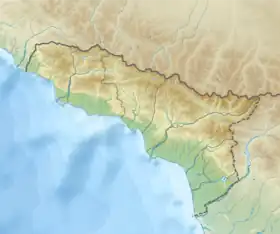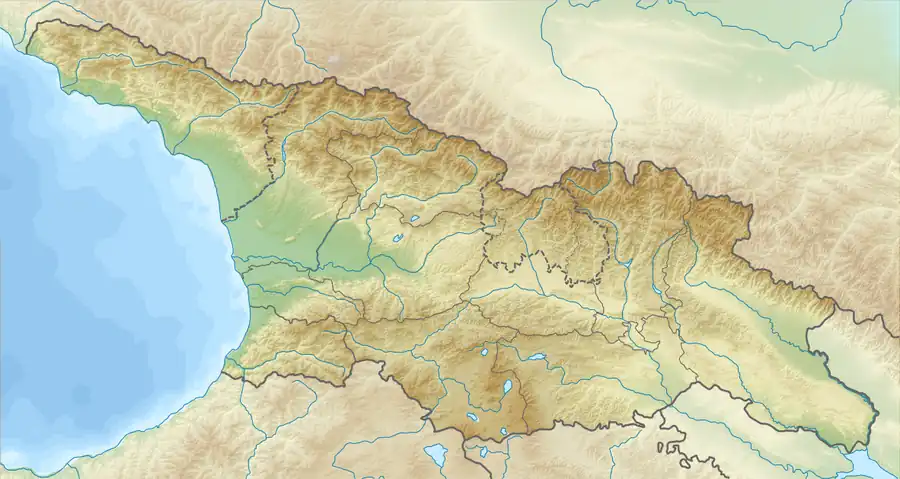| Psou | |
|---|---|
 | |
  | |
| Location | |
| Country | Georgia (Abkhazia[1]), Russia |
| Physical characteristics | |
| Source | |
| • location | Greater Caucasus |
| Mouth | |
• location | Black Sea |
• coordinates | 43°23′10″N 40°00′36″E / 43.3861°N 40.0101°E |
| Length | 53 km (33 mi) |
| Basin size | 421 km2 (163 sq mi) |
The Psou (/psoʊ/; Adyghe: Псыу; Georgian: ფსოუ; Abkhaz: Ҧсоу; Russian: Псоу) is a river in the West Caucasus, bordering the Gagra Range to the east. It flows along the southern slopes of the Greater Caucasus Mountain Range and forms a part of the border between Georgia (Abkhazia[1]) and Russia. Its source in the Aigra Mountain, and it flows into the Black Sea. The Psou is 53 kilometres (33 mi) long, and the drainage basin is approximately 421 square kilometres (163 sq mi).[2] Between the mouth of the river and the mouth of the Mzymta is a "sandy depositional foreland", which is approximately 8 kilometres (5.0 mi) in length and 2 kilometres (1.2 mi) wide.[3]
The principal tributaries of the Psou are the Besh and the Pkhista. Between 1913 and 1955 there was a hydrological station in operation at Leselidze, roughly 1.5 kilometres (0.93 mi) upstream of the river mouth.[2] The Psou gained notoriety as a smuggling route out of the country, by-passing Russian controls on the border.[4][5] As of 2008 it was still designated as a transboundary river which lacked an international cooperation agreement as part of the UNECE Water Convention.[6]
References
- 1 2 The political status of Abkhazia is disputed. Having unilaterally declared independence from Georgia in 1992, Abkhazia is formally recognised as an independent state by 5 UN member states (two other states previously recognised it but then withdrew their recognition), while the remainder of the international community recognizes it as as de jure Georgian territory. Georgia continues to claim the area as its own territory, designating it as Russian-occupied territory.
- 1 2 Our Waters: Joining Hands Across Borders : First Assessment of Transboundary Rivers, Lakes and Groundwaters. United Nations. Economic Commission for Europe, United Nations Publications. 2007. p. 149. ISBN 978-92-1-116972-0.
- ↑ Bird, Eric (25 February 2010). Encyclopedia of the World's Coastal Landforms. Springer Science & Business Media. p. 813. ISBN 978-1-4020-8638-0.
- ↑ Gori, Umberto; Paparela, Ivo (2006). Invisible Threats: Financial and Information Technology Crimes and National Security. IOS Press. p. 119. ISBN 978-1-58603-664-5.
- ↑ Cornell, Svante; Jonsson, Michael (11 January 2014). Conflict, Crime, and the State in Postcommunist Eurasia. University of Pennsylvania Press. p. 115. ISBN 978-0-8122-0898-6.
- ↑ Lagutov, Viktor (22 October 2008). Rescue of Sturgeon Species in the Ural River Basin. Springer Science & Business Media. p. 33. ISBN 978-1-4020-8924-4.